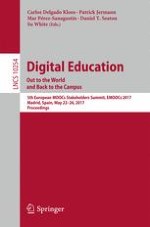2017 | OriginalPaper | Buchkapitel
Towards E-presence at Distance as a Way to Reach and Share E-quality: The Case of the ECO sMOOCs
verfasst von : Divina Frau-Meigs, Adeline Bossu
Erschienen in: Digital Education: Out to the World and Back to the Campus
Aktivieren Sie unsere intelligente Suche, um passende Fachinhalte oder Patente zu finden.
Wählen Sie Textabschnitte aus um mit Künstlicher Intelligenz passenden Patente zu finden. powered by
Markieren Sie Textabschnitte, um KI-gestützt weitere passende Inhalte zu finden. powered by
